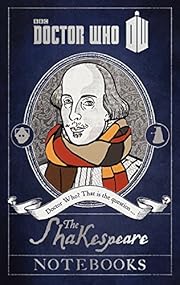

Auf ein Miniaturbild klicken, um zu Google Books zu gelangen.
|
Lädt ... The Shakespeare Notebooksvon James Goss, Jonathan Morris, Julian Richards, Justin Richards, William Shakespeare — 1 mehr, Matthew Sweet
 Keine Keine aktuelle Diskussion zu diesem Buch. If you need an idea of how big Doctor Who is these days it’s this; an indulgent cash cow based around a single joke which’ll amuse the overlap of a Venn diagram of Who fans and Shakespearians. It’s partially written by the range consulting editor and his son - I’ll forebear to comment on whether the latter was a commission of merit as the individual pieces aren’t credited. It’s essentially a series of fragments which interpolates the Doctor into Shakespeare with mixed results; sometimes it works by revelling in its absurdity (such as the version of A Midsummer Night’s Dream), sometimes by a clever storytelling conceit (the footnotes of Julius Caesar), and even once by inverting the joke (the Shakespeare-ising of An Unearthly Child). The better pieces generally have the virtue of constructing a story around the central gag, the lesser pieces are content to simply point and chuckle at the Doctor being in Shakespeare – the extended Macbeth which quickly palls is a particularly bad offender here. Sadly the latter type of piece tends to prevail so it comes across as a themed grab bag rather than a coherent book. Perhaps it might be an upmarket ‘toilet book’ but some kind of narrative conceit might have helped tie things together. As it is this is a collection of occasional highs mired in some repetitive lows. Working on the conceit that "The Shakespeare Code" was not the first or last time the Doctor and Shakespeare met, this book collects alternate versions of scenes from plays as well as the sonnets that imply the intertwined history of Time Lord and Bard. This one will definitely appeal to those who are both Shakespeare and Doctor Who fans and probably not many others. As I'm far less familiar with Classic Who some of the references in the various excerpts went over my head but I still had a lot of fun with this short read. Recommended if it sounds appealing to you. http://nwhyte.livejournal.com/2319367.html This is a bold step by BBC books: a set of sketches which basically all revolve around the same joke, the Doctor (and the Whoniverse) intruding in the fictional world of Shakespeare's plays. The authors include James Goss, who for my money is the best current writer of Who prose, and Matthew Sweet, who brings a certain lit crit depth to proceedings (not to neglect Jonathan Morris and Justin Richards who are both reliable writers of Who fiction). The fifth writer is an undergraduate. Combining Shakespeare and the Doctor is not new. On TV, quite apart from the 2007 story The Shakespeare Code, references to the Bard go back to his appearance on the Time-Space Visualiser which the First Doctor ripped off from the Space Museum in 1965. Actually the first reference in the Whoniverse is even earlier, in The Dalek Book from June 1964, in which young Daleks are told that "THE SHAKESPEARE PLAYS AND SONNETS WERE WRITTEN BY OUR EMPEROR". I listed the Who/Shakespeare crossovers of which I was then aware back in 2009. Although this book is basically 200 pages of the same joke, there are some really good twists on it. One would need a certain amount of familiarity with both sets of canonical texts to appreciate all of it - the insertion of Romana into Pericles is actually really funny but only if you know that particular scene from Pericles, which is not exactly Shakespeare's best-known play. But A Midsummer Night's Dream is much better known, and the recasting of the Rude Mechanicals as Sontarans performing a stage interpretation of the events of Horror of Fang Rock is brilliant. And the recasting of the Master as Mephistopheles to Marlowe as Faust, rewriting Shakespeare's plays to remove him and the Doctor from history, is a genius touch - the Master gets some hilarious lines too. Most of the rest is predictable but entertaining - I could have skipped the sonnets myself, though I see that other readers liked them. Worth the money anyway. Zeige 4 von 4 keine Rezensionen | Rezension hinzufügen
Gehört zur Reihe
Many people know about William Shakespeare's famous encounter with the Doctor at the Globe Theatre in 1599. But what few people know (though many have suspected) is that it was not the first time they met. Drawn from recently discovered archives, The Shakespeare Notebooks is the holy grail for Bard scholars: conclusive proof that the Doctor not only appeared throughout Shakespeare's life but also had a significant impact on his writing. In these pages you'll find early drafts of scenes and notes for characters that never appeared in the plays; discarded lines of dialogue and sonnets; never-before-seen journal entries; and much more. From the original notes for Hamlet (with a very different appearance by the ghost) and revealing early versions of the faeries of A Midsummer Night's Dream to strange stage directions revised to remove references to a mysterious blue box, The Shakespeare Notebooks is an astonishing document that offers a unique insight into the mind of one of history's most respected and admired figures. And also, of course, William Shakespeare. Keine Bibliotheksbeschreibungen gefunden. |
Aktuelle DiskussionenKeineBeliebte Umschlagbilder
 Google Books — Lädt ... Google Books — Lädt ...GenresMelvil Decimal System (DDC)822.92Literature English & Old English literatures English drama 1900- 2000-Klassifikation der Library of Congress [LCC] (USA)BewertungDurchschnitt: (3.63) (3.63)
Bist das du?Werde ein LibraryThing-Autor. |
||||||||||||||||||||||||||||||||||||||||||||||||||||||||||||||||||||||||||||||||||||||||||||||||||||||||||||||||||||||||
It does manage to be pretty funny in places, but, I don't know, the whole thing was really just a little bit too silly for me, even by Doctor Who standards. And I don't care how good a Doctor Who writer you are, putting your own prose side-by-side with Shakespeare's never does anybody any favors. (